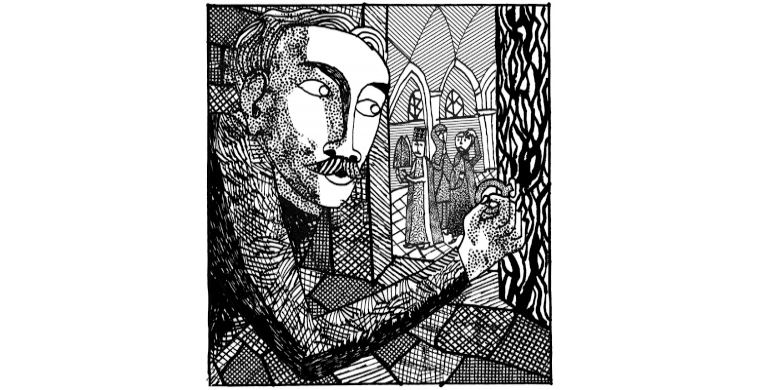Why C of E bishops are so bland
By Marcus Walker
THE SPECTATOR
October 12, 2024
Nolo episcopari. These were the words a person was expected to say on being offered an episcopal see. It basically translates as 'Don't bishop me!' and goes back to at least St Ambrose, who so wanted to avoid being made a bishop that he skipped town.
The Church of England has worked itself into a new position, Nemo episcopari nobody will be bishoped. In the past year, the process for appointing new bishops to Ely and Carlisle fell apart as the Crown Nominations Commission (CNC) decided not to appoint any of the shortlisted candidates.
This has created a sense of crisis in the Church, and an emergency meeting of the House of Bishops was held after a report was hastily drafted by the Bishop of London. It's not a bad report as far as it goes (although the proposal to give the archbishops two votes to break a deadlock isn't the most subtle attempt at centralising power that I've seen). The problem is that it doesn't ask the basic question at the heart of all this: are the right people being considered in the right way? I imagine the reason for not asking the question is that the answer might be unkind -- and unfair to the smattering of good and prayerful candidates who have slipped through.
Helmut Schmidt said politicians who have visions should see a doctor; maybe that should apply to bishops
But it needs to be asked. Nolo episcopari goes beyond a mere phrase. It recognises that the worst person to become a bishop is someone who wants to be one. This was very much what the C of E thought until about 15 years ago, when the then head of HR for a subsidiary of British Gas -- one Caroline Boddington -- took over appointments and everything changed. Those most likely to be considered for the post are now encouraged to pursue a clear career path which will train them in everything except how to be a long-serving parish priest.
First, candidates will almost certainly need to have been put on the imaginatively named 'ready now' lists for diocesan and suffragan sees. These are priests who have been noticed by their bishops and generally sent off to do the Strategic Leadership Development Programme, a scheme introduced by Mrs Boddington and co-developed by Paula Vennells (yes, that one) to teach ambitious clergy how to speak fluent management-ese.
Then they are invited to apply by filling out a small mountain of forms. It's a little hard to say Nolo episcopari after that. In the old days, nobody knew they were being considered -- a situation not without its complexities. But having people thrust themselves forward means getting the people who want to thrust themselves forward, the glint of episcopal ambition shining in the eye.
There is also another danger, which ironically flies against the stated intention of this new process: women and people from ethnic minorities are much less likely to put themselves forward for positions that they're not entirely sure they could do, whereas us white men have far less compunction about this.
Pity the candidates the amount of paperwork they have to fill in: a personal statement, a reflection on their call to that diocese, a reflection on the 'key criteria' for that diocese (a jargon-heavy document if ever you've seen one) and a diversity and inclusion statement. They have an interview with the national head of safeguarding and a nomination statement from their own bishop. You can tell this came from the secular world.
Frankly, I hardly want to know about any of that. I want to know what potential bishops think about God. How will they preach the Trinity? What does the love of Christ mean today? How will they shepherd their people and clergy? Helmut Schmidt said that politicians who have visions should go and see a doctor; maybe that should apply to bishops too (with an exemption for actual religious visions, for obvious reasons).
There is another reason for the new Nemo episcopari: that the Church is very split, especially about sexuality. It is heavily implied that when none of the candidates for Carlisle and Ely could get to the necessary two-thirds majority in the CNC it was because of their views on gay blessings (too pro in one case, too anti in the other).
This too is a consequence of the Boddington era, although Gordon Brown takes more of the blame. By changing the system so the prime minister is initially only sent one name (rather than two names as before), appointing a bishop became a zero-sum game. If you could send two names in, and someone else chooses between them, the CNC deadlock could be broken.
Alas, I fear Keir Starmer won't take back his historic responsibilities, but maybe we could learn something from the Copts, whose pope is selected from a shortlist of three by a blindfolded child. That adds a nice little element of chance to the proceedings, reminds us that St Matthias was chosen by lot, and is probably just as random as trusting the prime minister. It would also allow more interesting candidates to be considered -- academics, for example, who have almost completely vanished from the episcopacy. If the CNC only has one name to put forward, it will always go for the safe option. Is it any wonder the bench of bishops has become desperately monochrome in thought and theology?
The Rev. Marcus Walker is rector of the Priory Church of St. Bartholomew the Great, London














